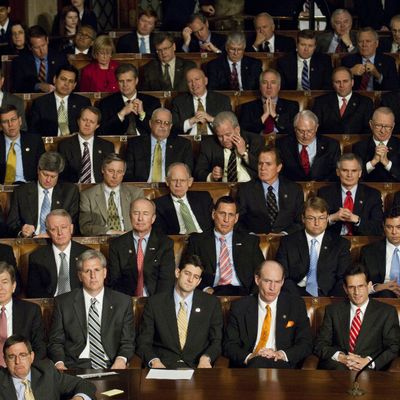
The current Republican line holds that the economy is in fine shape
but that the liberal news media is running slanted or false stories predicting a recession in a deliberate plot to induce one. “Our Economy is very strong, despite the horrendous lack of vision by Jay Powell and the Fed, but the Democrats are trying to ‘will’ the Economy to be bad for purposes of the 2020 Election,” scolds President Trump, “Very Selfish!” The conservative intelligentsia is supporting Trump’s paranoid diagnosis. Manhattan Institute senior fellow James Piereson argues that recession fears are inflated and asserts, “Current forecasts for a recession among pundits are not based on facts or real conditions but on a belief in self-fulfilling prophecies — that by predicting a recession they can create one, and thus set the stage for Democratic victory in 2020.”
The professions of confidence by Trump and his supporters that no recession is at hand is belied by their own behavior — especially Trump’s frantic attempts to pressure the Federal Reserve into loosening its monetary policy, along with the president’s renewed interest in cutting payroll taxes as stimulus. It’s also belied by a fair amount of data. Even the forecasts Piereson cites to support his confident prediction of no recession warn that a recession may well happen. (“The recent escalation of the US-China trade dispute and other geopolitical uncertainties increase the risk of a sharper slowdown than the base scenario.”)
But more curious than the right’s insistence that a recession won’t occur is its certainty that Democrats — working through their agents in the Fake News, naturally — are engineering one. Why would the right imagine such sinister motives? Perhaps the answer is that this is precisely how Republicans behaved in the opposition.
During the George W. Bush presidency, both parties professed to believe in the standard Keynesian economic premise that a temporarily higher deficit is the proper remedy to a slowing economy. Both parties supported fiscal stimulus in 2008, when the first signs of recession appeared. It was only during the Obama administration that Republicans reversed themselves and became fanatical advocates of fiscal and monetary tightening.
Tim Alberta’s new book, American Carnage, confirms and deepens previous reports that show just how cynically Republicans viewed the economic crisis of 2008. When Congress was debating a taxpayer-funded bailout in September 2008, Paul Ryan lectured his GOP colleagues that they needed to think of the country: “We’re Americans,” he said. “And if we don’t do something, this economy is going to crash.” However, Alberta notes, “[i]n truth, Ryan feared not just the crash itself” but the prospect such a crash would lead to a Republican wipeout at the polls; he warned that a crash would lead to “FDR on steroids.”
After Obama took office, the entire Republican legislative calculus revolved around the premise that Republicans were engaged in zero-sum competition — anything that helped Obama pass a stimulus bill hurt their party. When Obama expressed openness to their stimulus ideas in a private meeting, Alberta reports, they reacted with panic. “If he governs like that, we’re all fucked,” Eric Cantor’s communications director, Brad Dayspring, told his boss.
Alberta reports that Republicans declined to address infrastructure spending in their counterproposal to Obama precisely because they believed House Republicans would support it. “Boehner and Cantor both knew that the one thing that could buy off their members was big spending on roads and bridges,” Alberta reports. They declined to include any such spending in their offer, because the goal was not to improve the economic-rescue bill but to block it.
Throughout Obama’s presidency, Republicans not only demanded contractionary fiscal and monetary policy but staged a series of dangerous showdowns in order to force Obama to accept it. They managed to succeed in forcing cuts to domestic and military spending as a hostage payment for their threat to default on the national debt, parading the cuts as a trophy. The painful austerity they forced Obama into accepting helped slow the recovery. They likewise denounced the Federal Reserve for keeping interest rates too low, warning of inflation and a debased currency.
Of course, once a Republican had assumed office, they immediately reverted to the deficit-increasing spendthrifts they had been the last time they held office. Their views on monetary policy have followed suit. There was no evolution, no rethinking of premises or grappling with errors. The Republicans simply toggle their objective from full-scale expansion to full-scale contraction every time the White House changes hands. The pattern has held from the Clinton administration (which Republicans spent, like the Obama era, waxing hysterical about deficits) to the Bush administration, the Obama administration, and now the Trump administration.
Cynical people tend to assume everybody shares their cynicism. Republicans seem to assume their adversaries would do everything in their power to harm the economy when the opposition holds power because that is how the Republican Party operates.






























